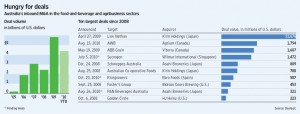By RACHEL PANNETT
CANBERRA, Australia—Australia's center-left Labor government said Tuesday it will examine foreign ownership of the country's rural land and agricultural food production in response to a spate of takeovers that have triggered anxiety about job losses and broader concerns about food security.
Worries about foreign ownership have been mostly limited to the mining and energy sectors, where a wave of investment by Chinese state-owned firms has threatened a loss of sovereignty and price control over commodities such as iron ore and coal. But last week's delisting of wheat exporter AWB Ltd., an icon of the country's agri-business, highlights increasing pressure on the country's agricultural companies.
AWB delisted Friday, following a court's approval of Canada-based Agrium Inc.'s takeover of the company.
"Whether there really are foreign-investment issues to be concerned by here, or whether there is actually a gap developing between anxiety and reality is the key question at hand," Assistant Treasurer Bill Shorten said Tuesday.
Mr. Shorten, along with the country's Foreign Investment Review Board and Treasurer Wayne Swan, is responsible for scrutinizing foreign investment applications.
Global interest in Australia's vast natural resources has posed a dilemma for the government, which at once wants to protect national interests and at the same time appear open to foreign investment.
Last year, Anglo-Australian mining giant Rio Tinto walked away from a proposed $19.5 billion deal with Aluminum Corp. of China, in part because of fears of the consequences of giving China direct access to a huge trove of natural resources. The proposed deal would have given state-owned Chinalco, an 18% stake in Rio Tinto, and would have given the Chinese company direct stakes in some mining assets.
The government said in a statement it has commissioned a research project by the Australian Bureau of Statistics, Rural Industries Research and Development Corporation, and chief commodities forecaster the Australian Bureau of Agricultural & Resource Economics to give a "better picture of the foreign investment landscape." That includes an agricultural census early next year to look at rural land and water ownership.
"Foreign investment is vital for Australian farmers and regional communities because it supports local jobs and economic growth and prosperity," Agriculture Minister Joe Ludwig said.
Existing official data show around 99% of broad acre and dairy farms in Australia are family-operated. Of the non-family-run farms, only around 0.1% are foreign-owned. Australia exports around 60% of its agricultural products and last year the country produced a food-trade surplus of more than 14 billion Australian dollars, or US$13.9 billion.
"Australia's food supply is secure and is built on a strong agriculture sector," Mr. Ludwig said.
Typically, Australia's rural heartland is the realm of the country's conservative Liberal-National coalition of center-right parties. But a hung Parliament after an August federal election that failed to give a clear majority to either of Australia's major political parties forced the Labor government of Prime Minister Julia Gillard to look outside its traditional urban base and secure the support of several rural-based independent lawmakers to form a minority government. That has stimulated a greater focus within the Gillard administration on rural areas.
Conservative Queensland-based independent Bob Katter on Monday presented a challenge in Parliament to a proposed $8.3 billion takeover of the country's largest stock-market operator by Singapore Exchange Ltd. The ASX takeover, which could create Asia's fifth-largest market operator, is a controversial political subject in Australia, where some fear moving control of the exchange overseas will damage the national interest.












